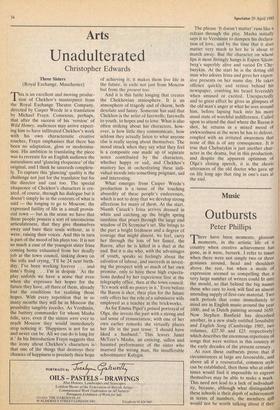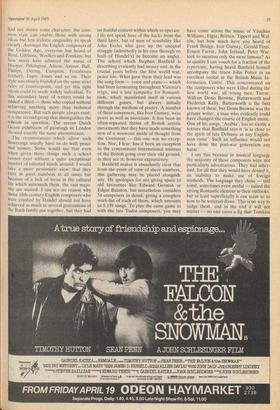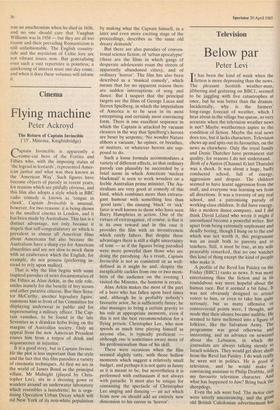Music
Outbursts
Peter Phillips
rr here have been moments, glorious 1 moments, in the artistic life of a country when creative achievement has gone, as it were, berserk. I refer to times when there were not simply two or three ,geniuses around, head and shoulders above the rest, but when a mode of expression seemed so compelling that very large number of writers could fit into the mould, so that behind the big names those who care to look will find an almost unending supply of first-rate material. Two such periods that come immediately to mind are in English music around the year 1600, and in Dutch painting around 1650. Now Stephen Banfield has described another, in a new study entitled Sensibility and English Song (Cambridge 1985, two volumes, £27.50 and £25 respectively) which describes the enormous repertoire of songs that were written in this country in the early decades of the present century. At root these outbursts prove that if circumstances at large are favourable, and above all if a resourceful, common style can be established, then those who at other times would find it impossible to express themselves may be able to make a mark. This need not lead to a lack of individual- ity, because, although what distinguishes these schools is their depth of achievement in terms of numbers, the members still would not be worth talking about if they
had not shown some character: the com- mon style can enable those with strong Ideas but less stylistic originality to speak clearly. Amongst the English composers of the Golden Age, everyone has heard of Byrd, Gibbons, Weelkes and Tomkins, but how many have admired the music of Hooper, Pilkington, Alison, Amner, Bull, Philips, Dering, Campion, Ferrabosco (either), Lupo, Jones and so on. Their style was closely founded on the same strict rules of counterpoint, and yet this tight idiom could he made widely individual. To this secondary layer of writers could be added a third — those who copied without achieving anything more than technical competence. But such people always exist; it is the second group that distinguishes the schools in question. The recent Dutch Genre exhibition of paintings in London showed exactly the same phenomenon.
The circumstances which allow such flowerings usually have to do with peace and money. Some would say that even When given these things such a school cannot exist without a quite exceptional number of talented minds around. I would take a more pessimistic view: that they exist in good numbers at all times but because of a lack of focus in the cultural life which surrounds them, the vast majo- rity are wasted. I can see no reason why those 18th-century English composers who Were crushed by Handel should not have achieved as much as several generations of the Bach family put together, but they had
no fruitful context within which to operate. I do not speak here of the hacks from the third layer, but of men of sensibility like John Eccles who gave up the unequal struggle (admittedly in his case through no fault of Handel's) to become an angler. The school which Stephen Banfield is describing evidently had money and, in the crucial years before the first world war, peace too. What gave them their lead was the song form — voice and piano — which had been fermenting throughout Victoria's reign, and a late sympathy for Romanti- cism, which manifested itself in various different guises, but always initially through the medium of poetry. A number of these composers, like Ivor Gurney, were poets as well as musicians. It has been an often-repeated theme of British artistic movements that they have made something new of a worn-out mode of thought from the Continent — this one was no excep- tion. Nor, I fear, has it been an exception to the concomitant international mistrust of the British going over their old ground, as they see it, however expressively.
Banfield makes it abundantly clear that from the point of view of sheer numbers, this gathering may be placed alongside any. He apologies for not giving space to old favourites like Edward German or Edgar Bainton, but nonetheless considers 54 composers in detail, giving a complete work-list of each of them, which amounts to 5,139 songs. To play the same game as with the late Tudor composers, you may
have come across .the music of Vaughan Williams, Elgar, Britten, Tippett and Wal- ton, but how much have you heard of Frank Bridge, Ivor Gurney, Gerald Finzi, Ernest Farrar, John Ireland, Peter War- lock to mention only the most famous? As to quality I can vouch for a fraction of the repertoire, having heard Banfield himself accompany the tenor John Potter in an excellent recital at the British Music In- formation Centre. This concentrated on the composers who were killed during the first world war, all young men: Farrar, William Denis Browne, Butterworth and Frederick Kelly. Butterworth is the best known of these, but Denis Browne was the greater writer, a man who evidently could have changed the course of English music, One of his songs, 'Arabia', has so exotic a texture that Banfield says it 'is 'as close to the spirit of late Debussy as any English- man came'. Such an influence would not have done the post-war generation any harm:
I say this because in musical language the majority of these composers were not particularly adventurous. They had inher- ited, for all that they would have denied it, an inability to make use of foreign methods. The language they chose — still tonal, sometimes even modal — suited the strong Romantic element in their outlooks, but at least superficially it can seem to us now to he watered-down, This is no way to judge them, and in the end it will not matter — no one cares a fig that Tomkins was an anachronism when he died in 1656, and no one should care that Vaughan Williams was in 1958 — but they are all too recent and their prevailing Romanticism is still unfashionable. The English country- side and the mysticism of Celtic lore are not vibrant issues now. But generalising over such a vast repertoire is pointless; a quickening of interest must one day come, and when it does these volumes will inform it.
















































 Previous page
Previous page